Charles E W Bean, Diaries, AWM38 3DRL 606/117/1 - September - December 1918 - Part 7
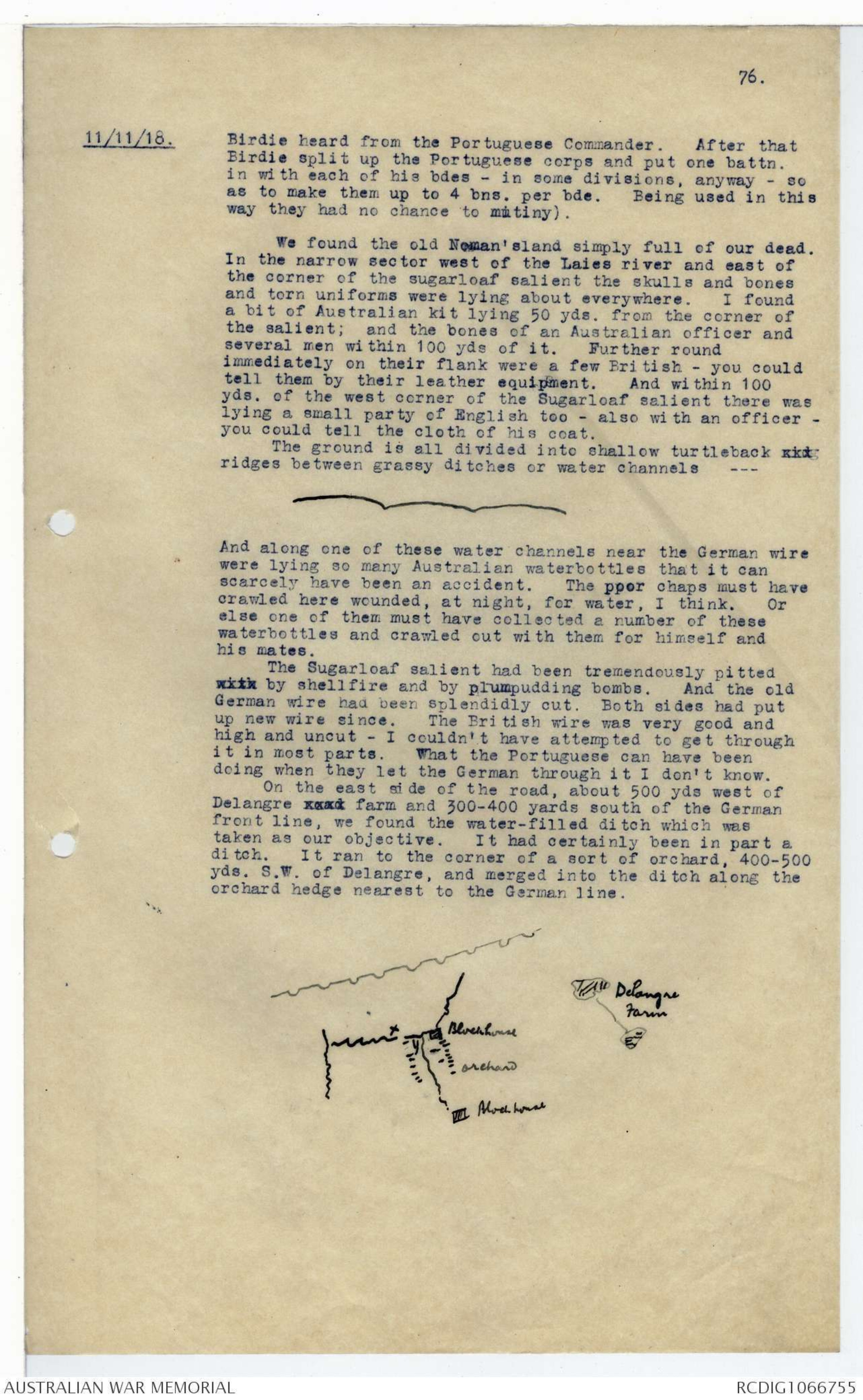
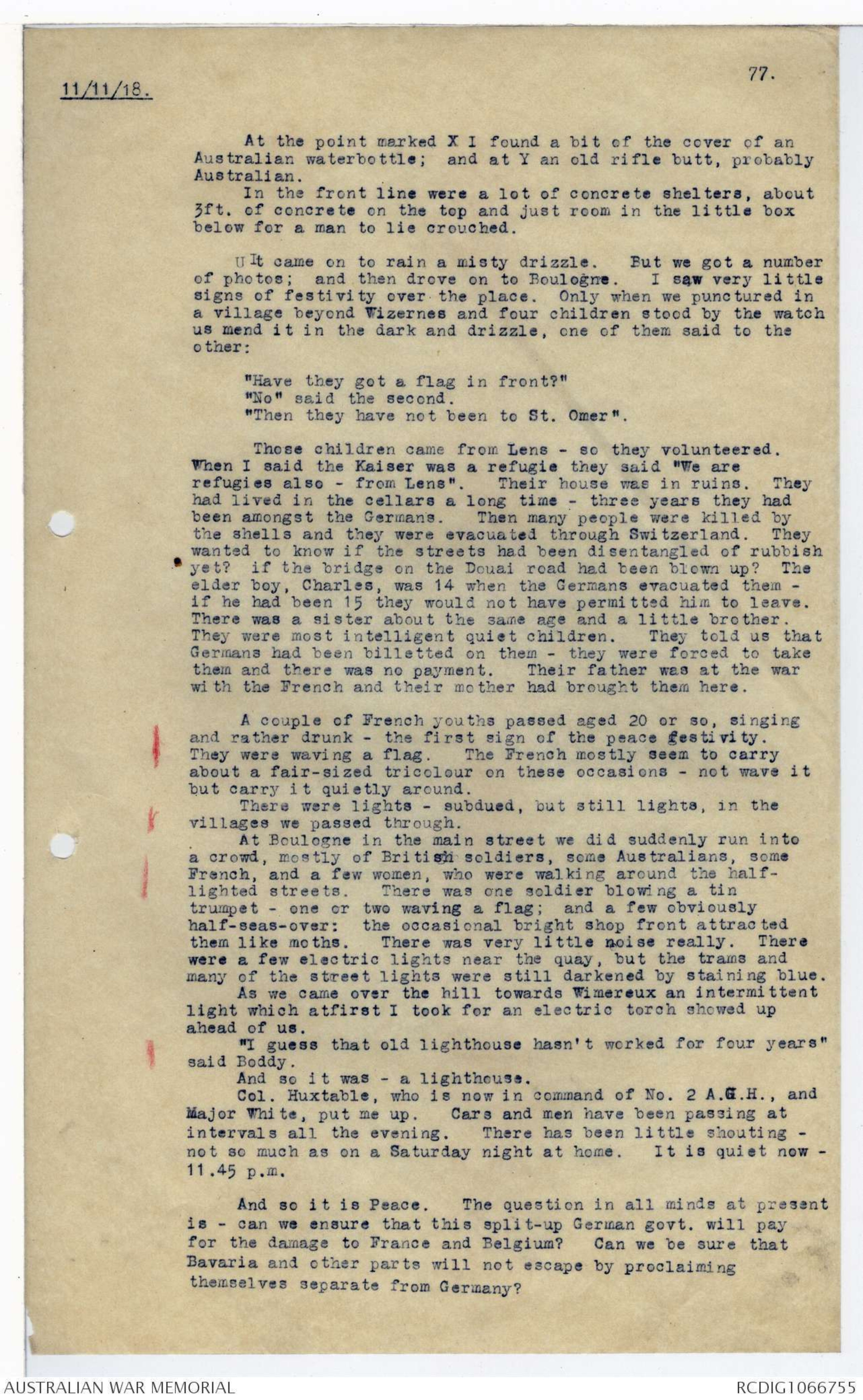
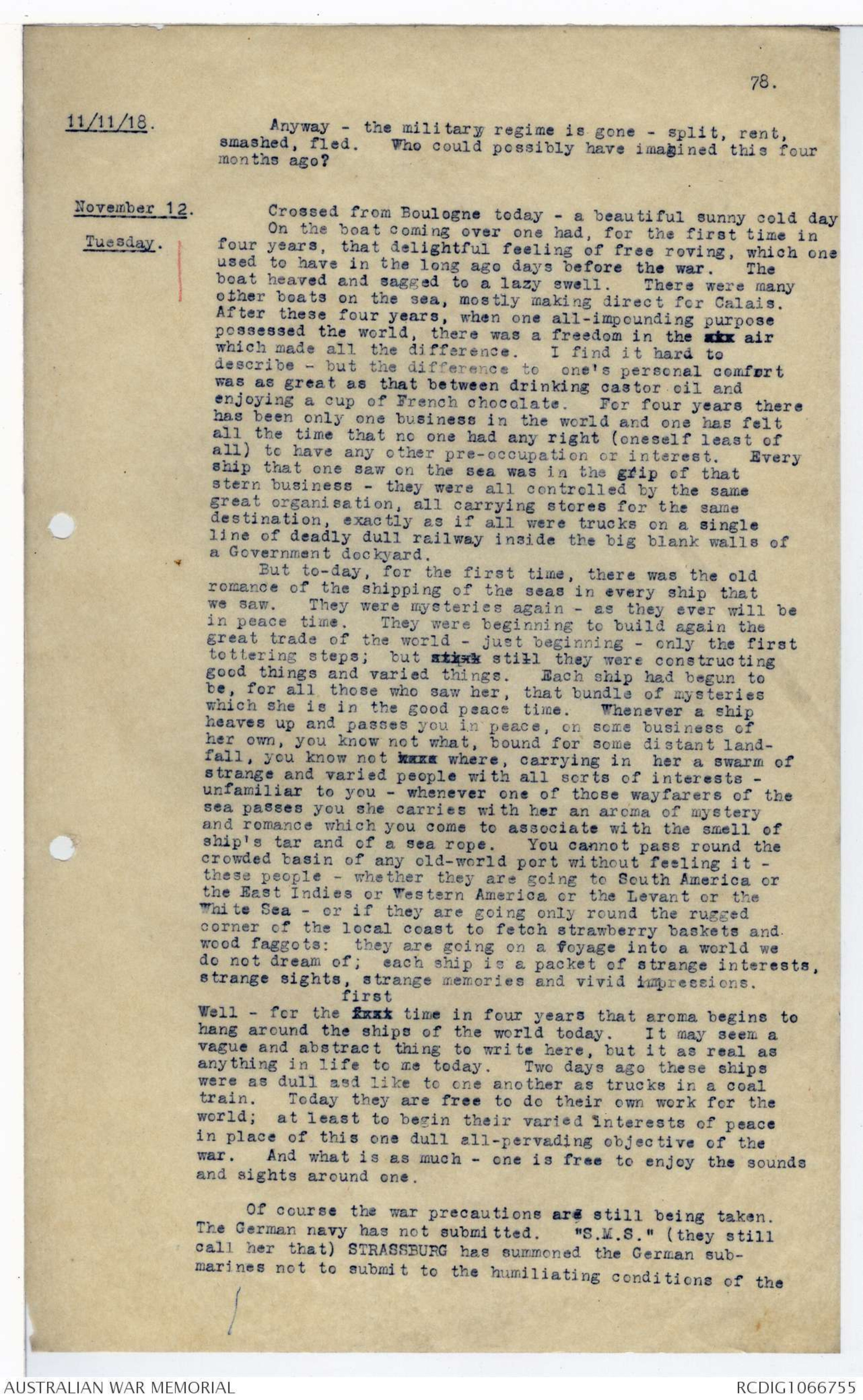
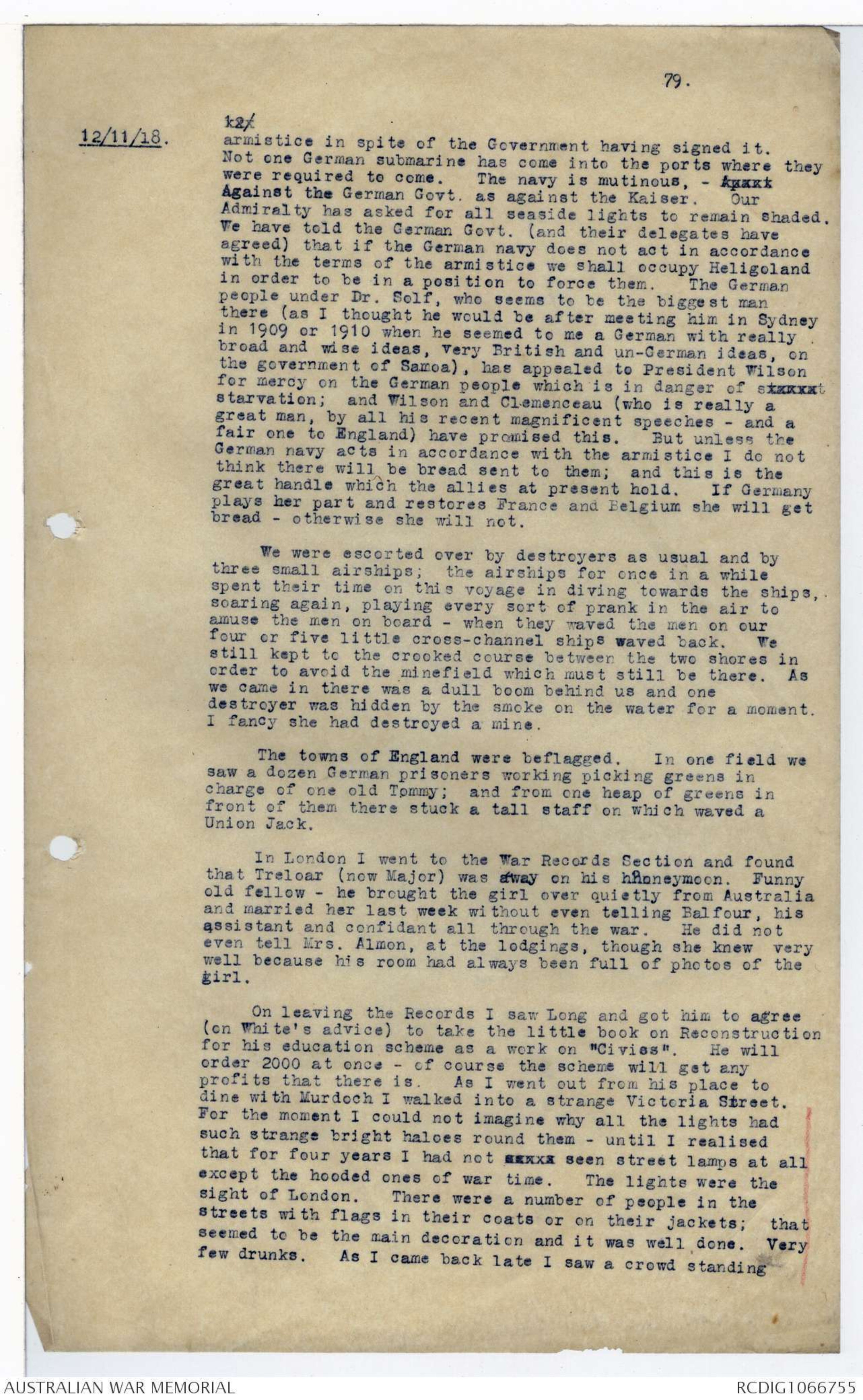
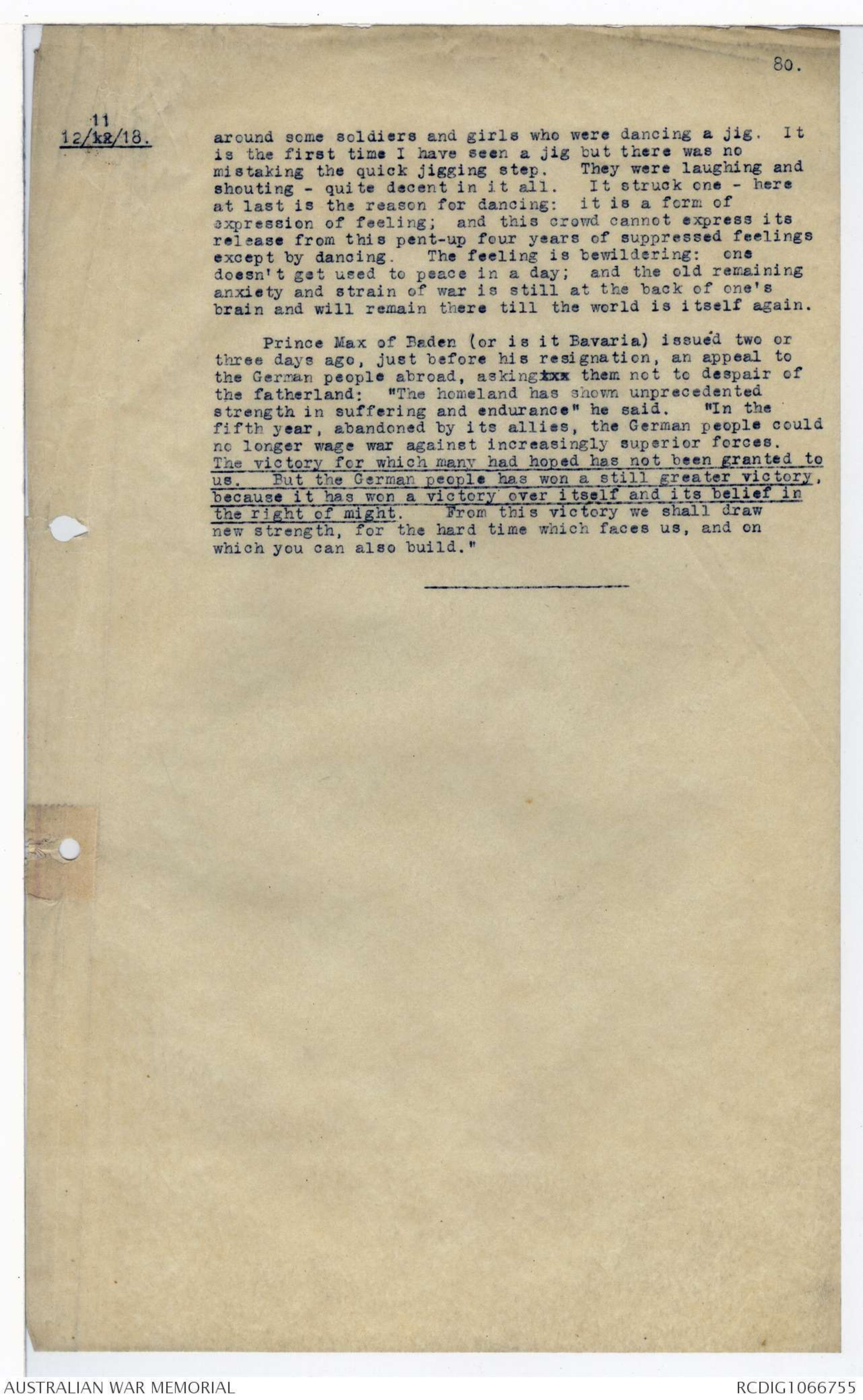
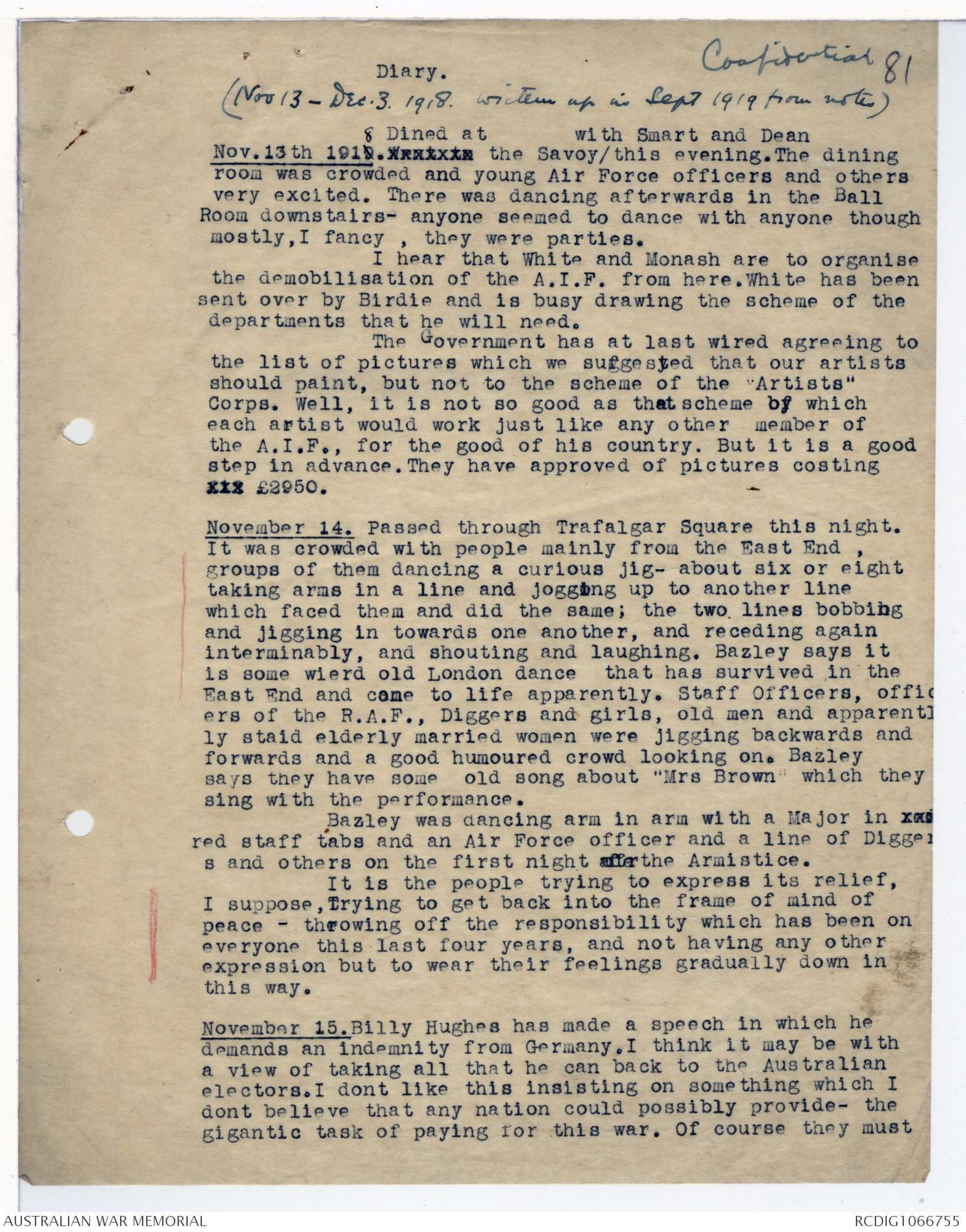
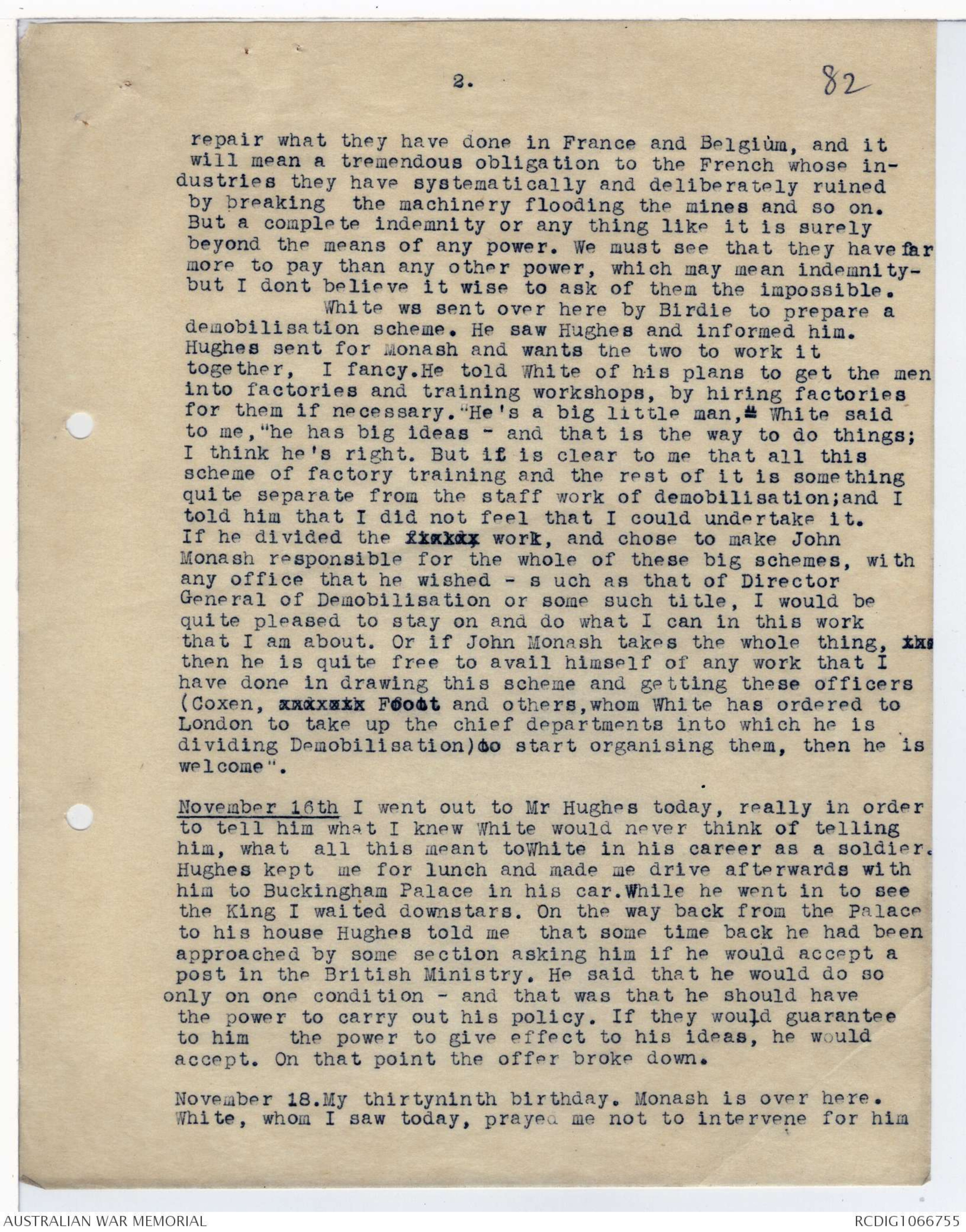
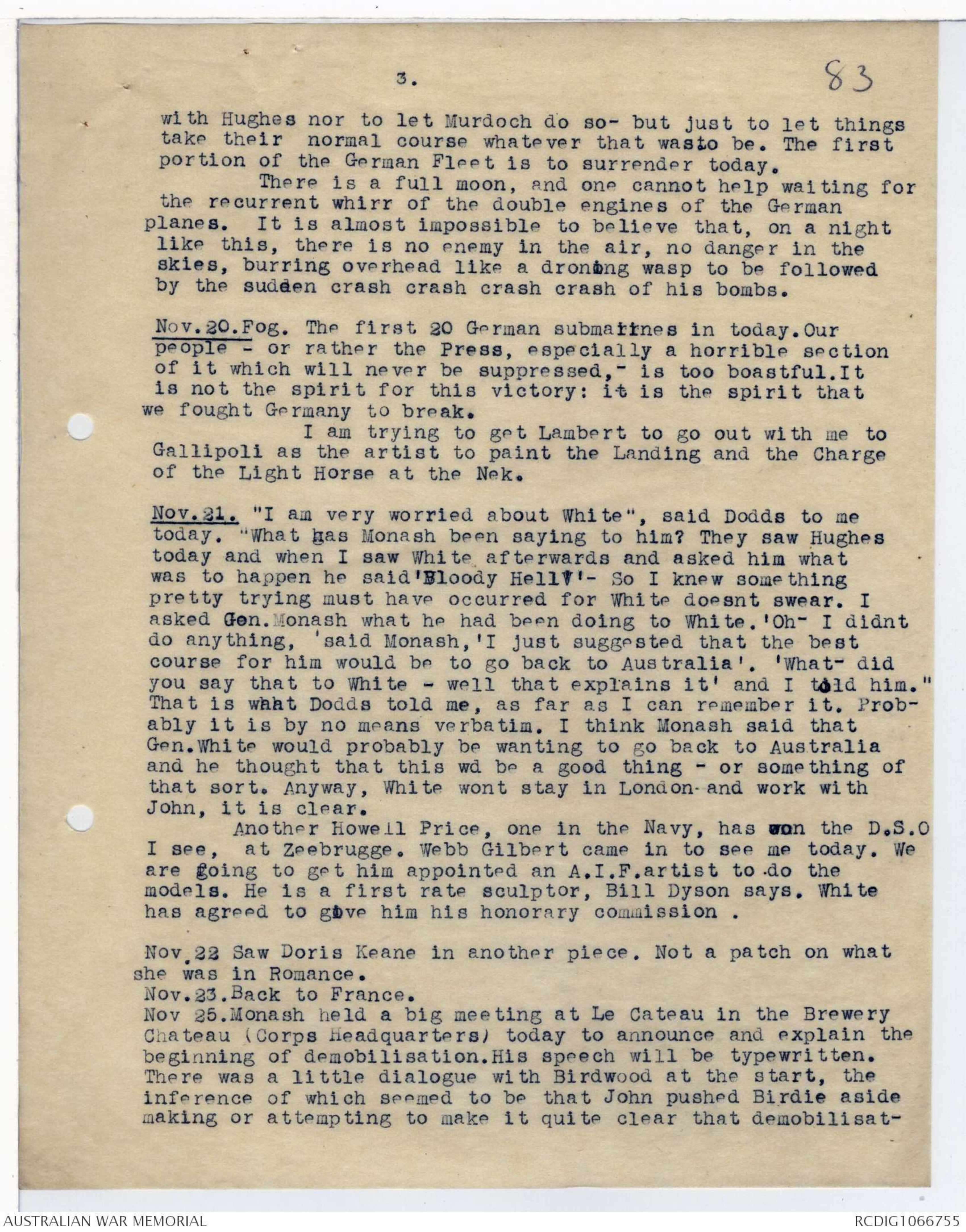
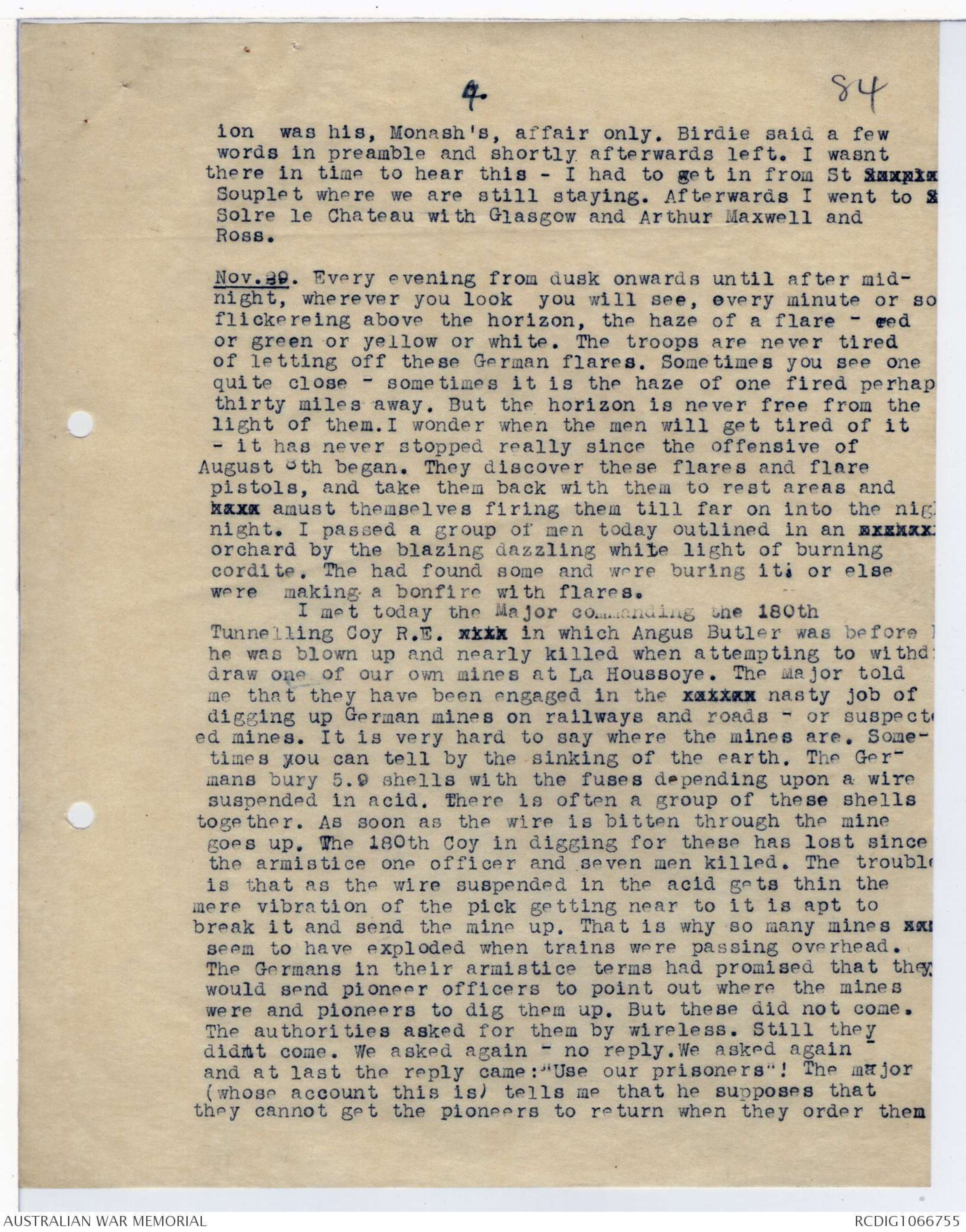
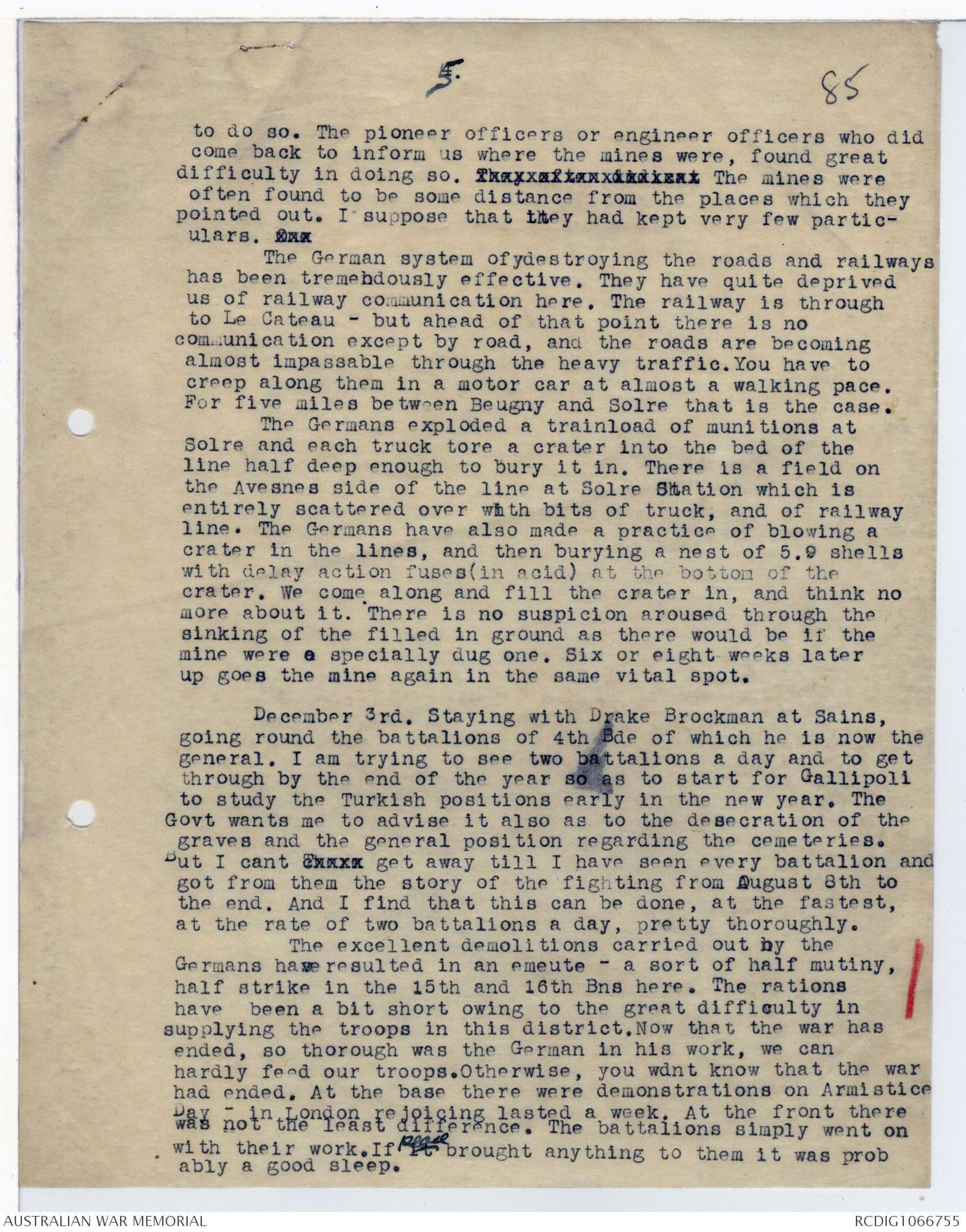
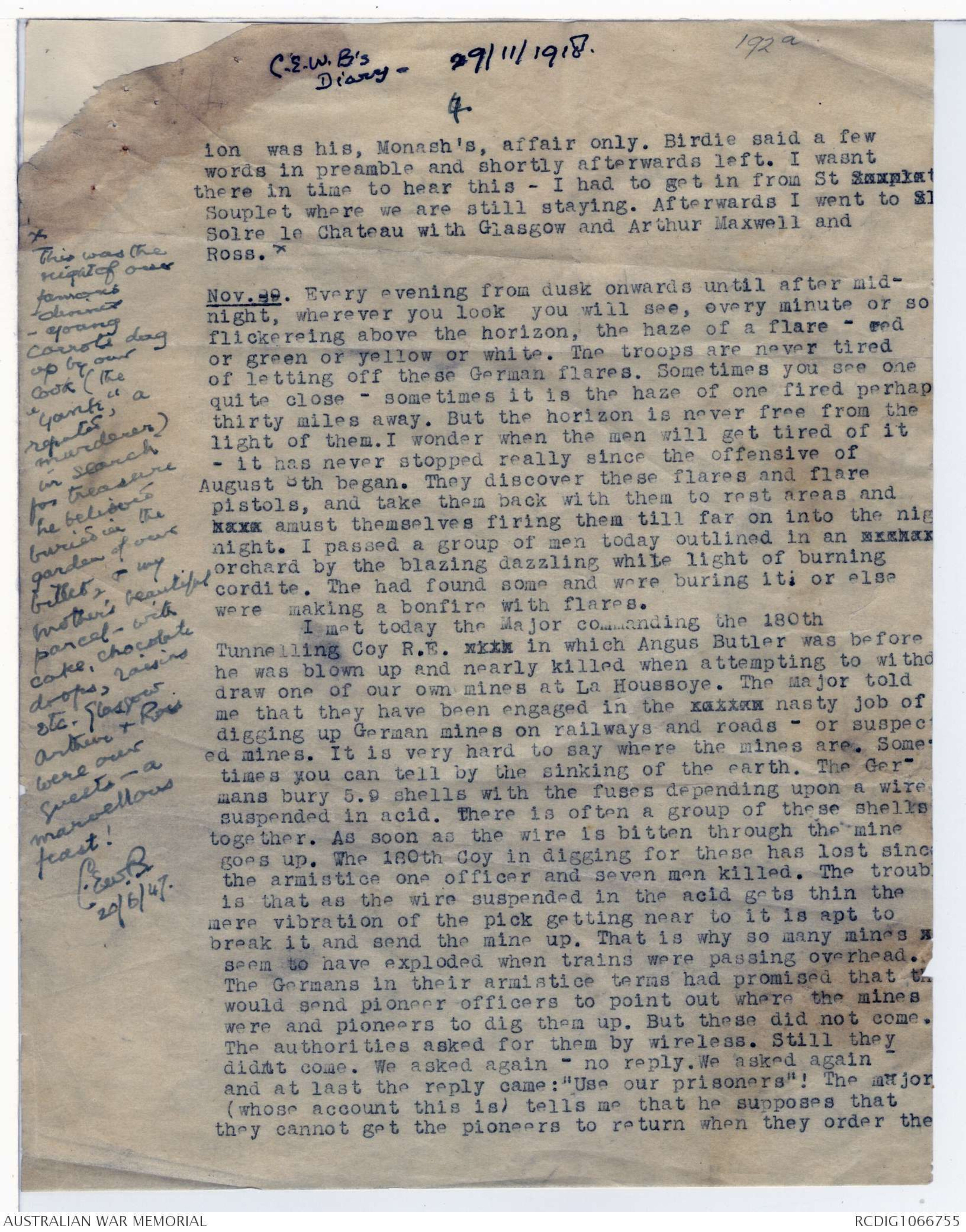
76.
11/11/18.
Birdie heard from the Portuguese Commander. After that
Birdie split up the Portuguese corps and put one battn.
in with each of his bdes - in some divisions, anyway - so
as to make them up to 4 bns. per bde. Being used in this
way they had no chance to muitiny).
We found the old Noman'sland simply full of our dead.
In the narrow sector west of the Laies river and east of
the corner of the sugarloaf salient the skulls and bones
and torn uniforms were lying about everywhere. I found
a bit of Australian kit lying 50 yds. from the corner of
the salient; and the bones of an Australian officer and
several men within 100 yds of it. Further round
immediately on their flank were a few British - you could
tell them by their leather equipment. And within 100
yds. of the west corner of the Sugarloaf salient there was
lying a small party of English too - also with an officer -
you could tell the cloth of his coat.
The ground is all divided into shallow turtleback xxx
ridges between grassy ditches or water channels ---
Drawing - see original document
And along one of these water channels near the German wire
were lying so many Australian waterbottles that it can
scarcely have been an accident. The ppoor chaps must have
crawled here wounded, at night, for water, I think. Or
else one of them must have collected a number of these
waterbottles and crawled out with them for himself and
his mates.
The Sugarloaf salient had been tremendously pittedwith by shellfire and by plumpudding bombs. And the old
German wire had been splendidly cut. Both sides had put
up new wire since. The British wire was very good and
high and uncut - I couldn't have attempted to get through
it in most parts. What the Portuguese can have been
doing when they let the German through it I don't know.
On the east side of the road, about 500 yds west of
Delangre xxxx farm and 300-400 yards south of the German
front line, we found the water-filled ditch which was
taken as our objective. It had certainly been in part a
ditch. It ran to the corner of a sort of orchard, 400-500
yds. S.W. of Delangre, and merged into the ditch along the
orchard hedge nearest to the German line.
Hand drawn diagram - see original
77.
11/11/18
At the point marked X I found a bit of the cover of an
Australian waterbottle; and at Y an old rifle butt, probably
Australian.
In the front line were a lot of concrete shelters, about
3ft. of concrete on the top and just room in the little box
below for a man to lie crouched.
It came on to rain a misty drizzle. But we got a number
of photos; and then drove on to Boulogne. I saw very little
signs of festivity over the place. Only when we punctured in
a village beyond Wizernes and four children stood by the watch
us mend it in the dark and drizzle, one of them said to the
other:
"Have they got a flag in front?"
"No” said the second.
"Then they have not been to St. Omer".
Those children came from Lens - so they volunteered.
When I said the Kaiser was a refugie they said "We are
refugies also - from Lens". Their house was in ruins. They
had lived in the cellars a long time - three years they had
been amongst the Germans. Then many people were killed by
the shells and they were evacuated through Switzerland. They
wanted to know if the streets had been disentangled of rubbish
yet? if the bridge on the Douai road had been blown up? The
elder boy, Charles, was 14 when the Germans evacuated them -
if he had been 15 they would not have permitted him to leave.
There was a sister about the same age and a little brother.
They were most intelligent quiet children. They told us that
Germans had been billetted on them - they were forced to take
them and there was no payment. Their father was at the war
with the French and their mother had brought them here.
A couple of French youths passed aged 20 or so, singing
and rather drunk - the first sign of the peace gfestivity.
They were waving a flag. The French mostly seem to carry
about a fair-sized tricolour on these occasions - not wave it
but carry it quietly around.
There were lights - subdued, but still lights, in the
villages we passed through.
At Boulogne in the main street we did suddenly run into
a crowd, mostly of British soldiers, some Australians, some
French, and a few women, who were walking around the half-
lighted streets. There was one soldier blowing a tin
trumpet - one or two waving a flag; and a few obviously
half-seas-over: the occasional bright shop front attracted
them like moths. There was very little noise really. There
were a few electric lights near the quay, but the trams and
many of the street lights were still darkened by staining blue.
As we came over the hill towards Wimereux an intermittent
light which atfirst I took for an electric torch showed up
ahead of us.
"I guess that old lighthouse hasn't worked for four years"
said Boddy.
And so it was - a lighthouse.
Col. Huxtable, who is now in command of No. 2 A.G.H., and
Major White, put me up. Cars and men have been passing at
intervals all the evening. There has been little shouting -
not so much as on a Saturday night at home. It is quiet now-
11.45 p.m.
And so it is Peace. The question in all minds at present
is - can we ensure that this split-up German govt. will pay
for the damage to France and Belgium? Can we be sure that
Bavaria and other parts will not escape by proclaiming
themselves separate from Germany?
78.
11/11/18.
Anyway - the military regime is gone - split, rent,
smashed, fled. Who could possibly have imagined this four
months ago?
November 12.
Tuesday.
Crossed from Boulogne today - a beautiful sunny cold day
On the boat coming over one had, for the first time in
four years, that delightful feeling of free roving, which one
used to have in the long ago days before the war. The
boat heaved and sagged to a lazy swell. There were many
other boats on the sea, mostly making direct for Calais.
After these four years, when one all-impounding purpose
possessed the world, there was a freedom in the xxx air
which made all the difference. I find it hard to
describe - but the difference to one's personal comfort
was as great as that between drinking castor oil and
enjoying a cup of French chocolate. For four years there
has been only one business in the world and one has felt
all the time that no one had any right (oneself least of
all) to have any other pre-occupation or interest. Every
ship that one saw on the sea was in the grip of that
stern business - they were all controlled by the same
great organisation, all carrying stores for the same
destination, exactly as if all were trucks on a single
line of deadly dull railway inside the big blank walls of
a Government dockyard.
But to-day, for the first time, there was the old
romance of the shipping of the seas in every ship that
we saw. They were mysteries again - as they ever will be
in peace time. They were beginning to build again the
great trade of the world - just beginning - only the first
tottering steps; but xxxxx still they were constructing
good things and varied things. Each ship had begun to
be, for all those who saw her, that bundle of mysteries
which she is in the good peace time. Whenever a ship
heaves up and passes you in peace, on some business of
her own, you know not what, bound for some distant land-
fall, you know not xxxx where, carrying in her a swarm of
strange and varied people with all sorts of interests -
unfamiliar to you - whenever one of those wayfarers of the
sea passes you she carries with her an aroma of mystery
and romance which you come to associate with the smell of
ship's tar and of a sea rope. You cannot pass round the
crowded basin of any old-world port without feeling it -
these people - whether they are going to South America or
the East Indies or Western America or the Levant or the
White Sea - or if they are going only round the rugged
corner of the local coast to fetch strawberry baskets and
wood faggots: they are going on a fvoyage into a world we
do not dream of; each ship is a packet of strange interests,
strange sights, strange memories and vivid impressions.
Well - for the xxxx ∧first time in four years that aroma begins to
hang around the ships of the world today. It may seem a
vague and abstract thing to write here, but it as real as
anything in life to me today. Two days ago these ships
were as dull asd like to one another as trucks in a coal
train. Today they are free to do their own work for the
world; at least to begin their varied interests of peace
in place of this one dull all-pervading objective of the
war. And what is as much - one is free to enjoy the sounds
and sights around one.
Of course the war precautions are still being taken.
The German navy has not submitted. "S.M.S." (they still
call her that) STRASSBURG has summoned the German sub-
marines not to submit to the humiliating conditions of the
79..2x
12/11/18.
armistice in spite of the Government having signed it.
Not one German submarine has come into the ports where they
were required to come. The navy is mutinous, - kaxxx
Against the German Govt. as against the Kaiser. Our
Admiralty has asked for all seaside lights to remain shaded.
We have told the German Govt. (and their delegates have
agreed) that if the German navy does not act in accordance
with the terms of the armistice we shall occupy Heligoland
in order to be in a position to force them. The German
people under Dr. Solf, who seems to be the biggest man
there (as I thought he would be after meeting him in Sydney
in 1909 or 1910 when he seemed to me a German with really
broad and wise ideas, very British and un-German ideas, on
the government of Samoa), has appealed to President Wilson
for mercy on the German people which is in danger of sxxxt
starvation; and Wilson and Clemenceau (who is really a
great man, by all his recent magnificent speeches - and a
fair one to England) have promised this. But unless the
German navy acts in accordance with the armistice I do not
think there will be bread sent to them; and this is the
great handle which the allies at present hold. If Germany
plays her part and restores France and Belgium she will get
bread - otherwise she will not.
We were escorted over by destroyers as usual and by
three small airships; the airships for once in a while
spent their time on this voyage in diving towards the ships,
soaring again, playing every sort of prank in the air to
amuse the men on board - when they waved the men on our
four or five little cross-channel ships waved back. We
still kept to the crooked course between the two shores in
order to avoid the minefield which must still be there. As
we came in there was a dull boom behind us and one
destroyer was hidden by the smoke on the water for a moment.
I fancy she had destroyed a mine.
The towns of England were beflagged. In one field we
saw a dozen German prisoners working picking greens in
charge of one old Tommy; and from one heap of greens in
front of them there stuck a tall staff on which waved a
Union Jack.
In London I went to the War Records Section and found
that Treloar (now Major) was away on his h∧ooneymoon. Funny
old fellow - he brought the girl over quietly from Australia
and married her last week without even telling Balfour, his
assistant and confidant all through the war. He did not
even tell Mrs. Almon, at the lodgings, though she knew very
well because his room had always been full of photos of the
girl.
On leaving the Records I saw Long and got him to agree
(on White's advice) to take the little book on Reconstruction
for his education scheme as a work on "Civies". He will
order 2000 at once - of course the scheme will get any
profits that there is. As I went out from his place to
dine with Murdoch I walked into a strange Victoria Sftreet.
For the moment I could not imagine why all the lights had
such strange bright haloes round them - until I realised
that for four years I had not xxxxx seen street lamps at all
except the hooded ones of war time. The lights were the
sight of London. There were a number of people in the
streets with flags in their coats or on their jackets: that
seemed to be the main decoration and it was well done. Very
few drunks. As I came back late I saw a crowd standing
80.
11
12/k2/18
around some soldiers and girls who were dancing a jig. it
is the first time I have seen a jig but there was no
mistaking the quick jigging step. They were laughing and
shouting - quite decent in it all. It struck one - here
at last is the reason for dancing: it is a form of
expression of feeling; and this crowd cannot express its
release form this pent-up four years of suppressed feelings
except by dancing. The feeling is bewildering: one
doesn't get used to peace in a day; and the old remaining
anxiety and strain of war is still at the back of one's
brain and will remain there till the world is itself again.
Prince Max of Baden (or is it Bavaria) issued two or
three days ago, just before his resignation, an appeal to the
German people abroad, asking xxx them not to despair of
the fatherland: "The homeland has shown unprecedented
strength in suffering and endurance" he said. "In the
fifth year, abandoned by its allies, the German people could
no longer wage war against increasingly superior forces.
The victory for which many had hoped has not been granted to
us. But the German people has won a still greater victory.
because it has won a victory over itself and its belief in
the right of might. From this victory we shall draw
new strength, for the hard time which faces us, and on
which you can also build."
Confidential
81
Diary.
(Nov 13-Dec. 3 1918. Written up in Sept 1919 from notes)
Nov. 13th 19198 xxxxxxx ∧Dined at the Savoy ∧with Smart and Dean this evening.
The dining
room was crowded and young Air Force officers and others
very excited. There was dancing afterwards in the Ball
Room downstairs- anyone seemed to dance with anyone though
mostly, I fancy, they were parties.
I hear that White and Monash are to organise
the demobilisation of the A.I.F. from here. White has been
sent over by Birdie and is busy drawing the scheme of the
departments that he will need.
The Government has at last wired agreeing to
the list of pictures which we suggested that our artists
should paint, but not to the scheme of the "Artists"
Corps. Well, it is not so good as that scheme by which
each artist would work just like any other, member of
the A.I.F., for the good of his country. But it is a good
step in advance. They have approved of pictures costingxxx £2950.
November 14. Passed through Trafalgar Square this night.
It was crowded with people mainly from the East End ,
groups of them dancing a curious jig- about six or eight
taking arms in a line and joggoing up to another line
which faced them and did the same; the two lines bobbing
and jigging in towards one another, and receding again
interminably, and shouting and laughing. Bazley says it
is some wierd old London dance that has survived in the
East End and caome to life apparently. Staff Officers, officers
of the R.A.F., Diggers and girls, old men and apparently
staid elderly married women were jigging backwards and
forwards and a good humoured crowd looking on. Bazley
says they have some, old song about "Mrs Brown" which they
sing with the performance.
Bazley was dancing arm in arm with a Major in xx
red staff tabs and an Air Force officer and a line of Diggers
and others on the first night after the Armistice.
It is the people trying to express its relief,
I suppose, Trying to get back into the frame of mind of
peace - throwing off the responsibility which has been on
everyone this last four years, and not having any other
expression but to wear their feelings gradually down in
this way.
November 15. Billy Hughes has made a speech in which he
demands an indemnity from Germany. I think it may be with
a view of taking all that he can back to the Australian
electors. I dont like this insisting on something which I
dont believe that any nation could possibly provide- the
gigantic task of paying for this war. Of course they must
2.
82
repair what they have done in France and Belgium, and it
will mean a tremendous obligation to the French whose industries
they have systematically and deliberately ruined
by breaking the machinery flooding the mines and so on.
But a complete indemnity or any thing like it is surely
beyond the means of any power. We must see that they have far
more to pay than any other power, which may mean indemnity-
but I dont believe it wise to ask of them the impossible.
White ws sent over here by Birdie to prepare a
demobilisation scheme. He saw Hughes and informed him.
Hughes sent for Monash and wants the two to work it
together, I fancy. He told White of his plans to get the men
into factories and training workshops, by hiring factories
for them if necessary. "He's a big little man," - White said
to me, "he has big ideas - and that is the way to do things;
I think he's right. But if is clear to me that all this
scheme of factory training and the rest of it is something
quite separate from the staff work of demobilisation; and I
told him that I did not feel that I could undertake it.
If he divided the field, work, and chose to make John
Monash responsible for the whole of these big schemes, with
any office that he wished - s uch as that of Director
General of Demobilisation or some such title, I would be
quite pleased to stay on and do what I can in this work
that I am about. Or if John Monash takes the whole thing, xxx
then he is quite free to avail himself of any work that I
have done in drawing this scheme and getting these officers
(Coxen, xxxxxxx Ffooott and others, whom White has ordered to
London to take up the chief departments into which he is
dividing Demobilisation) oto start organising them, then he is
welcome".
November 16th I went out to Mr Hughes today, really in order
to tell him what I knew White would never think of telling
him, what all this meant toWhite in his career as a soldier.
Hughes kept me for lunch and made me drive afterwards with
him to Buckingham Palace in his car. While he went in to see
the King I waited downstars. On the way back from the Palace
to his house Hughes told me that some time back he had been
approached by some section asking him if he would accept a
post in the British Ministry. He said that he would do so
only on one condition - and that was that he should have
the power to carry out his policy. If they would guarantee
to him the power to give effect to his ideas, he would
accept. On that point the offer broke down.
November 18.My thirtyninth birthday. Monash is over here.
White, whom I saw today, prayed me not to intervene for him
3.
83
with Hughes nor to let Murdoch do so- but just to let things
take their normal course whatever that wasto be. The first
portion of the German Fleet is to surrender today.
There is a full moon, and one cannot help waiting for
the recurrent whirr of the double engines of the German
planes. It is almost impossible to believe that, on a night
like this, there is no enemy in the air, no danger in the
skies, burring overhead like a droning wasp to be followed
by the sudden crash crash crash crash of his bombs.
Nov.20.Fog. The first 20 German submarines in today. Our
people - or rather the Press, especially a horrible section
of it which will never be suppressed, - is too boastful.It
is not the spirit for this victory: it is the spirit that
we fought Germany to break.
I am trying to get Lambert to go out with me to
Gallipoli as the artist to paint the Landing and the Charge
of the Light Horse at the Nek.
Nov.21. "I am very worried about White", said Dodds to me
today. "What has Monash been saying to him? They saw Hughes
today and when I saw White afterwards and asked him what
was to happen he said'Bloody Hell'- So I knew something
pretty trying must have occurred for White doesnt swear. I
asked Gen. Monash what he had been doing to White. 'Oh- I didnt
do anything, 'said Monash, 'I just suggested that the best
course for him would be to go back to Australia'. 'What- did
you say that to White - well that explains it' and I told him."
That is what Dodds told me, as far as I can remember it. Probably
it is by no means verbatim. I think Monash said that
Gen. White would probably be wanting to go back to Australia
and he thought that this wd be a good thing - or something of
that sort. Anyway, White wont stay in London-and work with
John, it is clear.
Another Howell Price, one in the Navy, has won the D.S.O
I see, at Zeebrugge. Webb Gilbert came in to see me today. We
are going to get him appointed an A.I.F.artist to do the
models. He is a first rate sculptor, Bill Dyson says. White
has agreed to give him his honorary commission.
Nov.22 Saw Doris Keane in another piece. Not a patch on what
she was in Romance.
Nov.23.Back to France.
Nov 25.Monash held a big meeting at Le Cateau in the Brewery
Chateau (Corps Headquarters) today to announce and explain the
beginning of demobilisation. His speech will be typewritten.
There was a little dialogue with Birdwood at the start, the
inference of which seemed to be that John pushed Birdie aside
making or attempting to make it quite clear that demobilisation
84
4.
was his, Monash's, affair only. Birdie said a few
words in preamble and shortly afterwards left. I wasnt
there in time to hear this - I had to get in from St xxxxxx
Souplet where we are still staying. Afterwards I went to x
Solre le Chateau with Glasgow and Arthur Maxwell and
Ross.
Nov.29. Every evening from dusk onwards until after mid-
night, wherever you look, you will see, every minute or so
flickereing above the horizon, the haze of a flare - red
or green or yellow or white. The troops are never tired
of letting off these German flares. Sometimes you see one
quite close - sometimes it is the haze of one fired perhap
thirty miles away. But the horizon is never free from the
light of them. I wonder when the men will get tired of it
- it has never stopped really since the offensive of
August 8th began. They discover these flares and flare
pistols, and take them back with them to rest areas andxxxx amust themselves firing them till far on into the nig
night. I passed a group of men today outlined in an xxxxxx
orchard by the blazing dazzling while light of burning
cordite. The had found some and were buring it; or else
were making a bonfire with flares.
I met today the Major commanding the 180th
Tunnelling Coy R.E. xxxx in which Angus Butler was before
he was blown up and nearly killed when attempting to withd
draw one of our own mines at La Houssoye. The Major told
me that they have been engaged in the xxxxxx nasty job of
digging up German mines on railways and roads - or suspect
ed mines. It is very hard to say where the mines are. Sometimes
you can tell by the sinking of the earth. The Germans
bury 5.9 shells with the fuses depending upon a wire
suspended in acid. There is often a group of these shells
together. As soon as the wire is bitten through the mine
goes up. The 180th Coy in digging for these has lost since
the armistice one officer and seven men killed. The trouble
is that as the wire suspended in the acid gets thin the
mere vibration of the pick getting near to it is apt to
break it and send the mine up. That is why so many mines xxx
seem to have exploded when trains were passing overhead.
The Germans in their armistice terms had promised that they
would send pioneer officers to point out where the mines
were and pioneers to dig them up. But these did not come.
The authorities asked for them by wireless. Still they
didnt come. We asked again - no reply. We asked again
and at last the reply came: "Use our prisoners"! The major
(whose account this is) tells me that he supposes that
they cannot get the pioneers to return when they order them
5.
85
to do so. The pioneer officers or engineer officers who did
come back to inform us where the mines were, found great
difficulty in doing so. kaxxxxzz The mines were
often found to be some distance from the places which they
pointed out. I suppose that they had kept very few particulars.xxx
The German system of ydestroying the roads and railways
has been tremendously effective. They have quite deprived
us of railway communication here. The railway is through
to Le Cateau - but ahead of that point there is no
communication except by road, and the roads are becoming
almost impassable through the heavy traffic. You have to
creep along them in a motor car at almost a walking pace.
For five miles between Beugny and Solre that is the case.
The Germans exploded a trainload of munitions at
Solre and each truck tore a crater into the bed of the
line half deep enough to bury it in. There is a field on
the Avesnes side of the line at Solre Station which is
entirely scattered over with bits of truck, and of railway
line. The Germans have also made a practice of blowing a
crater in the lines, and then burying a nest of 5.9 shells
with delay action fuses (in acid) at the bottom of the
crater. We come along and fill the crater in, and think no
more about it. There is no suspicion aroused through the
sinking of the filled in ground as there would be if the
mine were a specially dug one. Six or eight weeks later
up goes the mine again in the same vital spot.
December 3rd. Staying with Drake Brockman at Sains,
going round the battalions of 4th Bde of which he is now the
general. I am trying to see two battalions a day and to get
through by the end of the year so as to start for Gallipoli
to study the Turkish positions early in the new year. The
Govt wants me to advise it also as to the desecration of the
graves and the general position regarding the cemeteries.
But I cant xxxxx get away till I have seen every battalion and
got from them the story of the fighting from August 8th to
the end. And I find that this can be done, at the fastest,
at the rate of two battalions a day, pretty thoroughly.
The excellent demolitions carried out by the
Germans have resulted in an emeute - a sort of half mutiny,
half strike in the 15th and 16th Bns here. The rations
have been a bit short owing to the great difficulty in
supplying the troops in this district. Now that the war has
ended, so thorough was the German in his work, we can
hardly feed our troops.Otherwise, you wdnt know that the war
had ended. At the base there were demonstrations on Armistice
Day - in London rejoicing lasted a week. At the front there
was not the least difference. The battalions simply went on
with their work. If ∧peace it brought anything to them it was probably
a good sleep.
192a
C.E.W.B's Diary - 20/11/1918.
[*This was the night of our famous dinner- young carrots dug up by our cook (the"yank" a reputed murderer)in search for treasure he believed buried in the
garden of our billet & my mother's beautiful parcel - with
cake, chocolate drops, raisins, etc. Glasgow Arthur & Ross
were our guests - a marvellous feast!
C.E.W.B. 20/6/47*]
4.ion was his, Monash's, affair only. Birdie said a few
words in preamble and shortly afterwards left. I wasnt
there in time to hear this - I had to get in from St xxxxxx
Soup let where we are still staying. Afterwards I went to x
Solre le Chateau with Glasgow and Arthur Maxwell and
Ross.
Nov.29. Every evening from dusk onwards until after mid-
night, wherever you look, you will see, every minute or so
flickereing above the horizon, the haze of a flare - red
or green or yellow or white. The troops are never tired
of letting off these German flares. Sometimes you see one
quite close - sometimes it is the haze of one fired perhap
thirty miles away. But the horizon is never free from the
light of them. I wonder when the men will get tired of it
- it has never stopped really since the offensive of
August 8th began. They discover these flares and flare
pistols, and take them back with them to rest areas andxxxx amust themselves firing them till far on into the nig
night. I passed a group of men today outlined in an xxxxxx
orchard by the blazing dazzling while light of burning
cordite. The had found some and were buring it; or else
were making a bonfire with flares.
I met today the Major commanding the 180th
Tunnelling Coy R.E. xxxx in which Angus Butler was before
he was blown up and nearly killed when attempting to withd
draw one of our own mines at La Houssoye. The Major told
me that they have been engaged in the xxxxxx nasty job of
digging up German mines on railways and roads - or suspect
ed mines. It is very hard to say where the mines are. Some-
times you can tell by the sinking of the earth. The Germans
bury 5.9 shells with the fuses depending upon a wire
suspended in acid. There is often a group of these shells
together. As soon as the wire is bitten through the mine
goes up. The 180th Coy in digging for these has lost since
the armistice one officer and seven men killed. The trouble
is that as the wire suspended in the acid gets thin the
mere vibration of the pick getting near to it is apt to
break it and send the mine up. That is why so many mines xxx
seem to have exploded when trains were passing overhead.
The Germans in their armistice terms had promised that they
would send pioneer officers to point out where the mines
were and pioneers to dig them up. But these did not come.
The authorities asked for them by wireless. Still they
didnt come. We asked again - no reply. We asked again
and at last the reply came: "Use our prisoners"! The major
(whose account this is) tells me that he supposes that
they cannot get the pioneers to return when they order them
 Sam scott
Sam scottThis transcription item is now locked to you for editing. To release the lock either Save your changes or Cancel.
This lock will be automatically released after 60 minutes of inactivity.